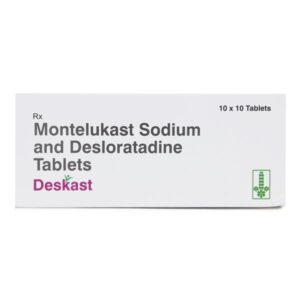DESLORATADINE + MONTELUKAST
Desloratadine: Desloratadine is an antihistamine medication used to treat symptoms of allergies such as sneezing, runny nose, itching, and watery eyes. It is commonly prescribed for conditions like hay fever (allergic rhinitis) and hives (urticaria).
The drug works by blocking the action of histamine, which is a chemical released by the body in response to allergens. By inhibiting histamine, Desloratadine helps to reduce the symptoms associated with allergies.
The recommended dose of Desloratadine for adults and children 12 years and older is 5mg once daily. For children between the ages of 6 and 11 years, the recommended dose is 2.5mg once daily. It is important to follow the dosage instructions provided by your doctor or as indicated on the medication label.
Like any medication, Desloratadine may cause side effects. Common side effects may include drowsiness, fatigue, headache, dry mouth, sore throat, and abdominal pain. However, these side effects are usually mild and temporary. Serious side effects are rare but may include fast or irregular heartbeat, severe dizziness, difficulty urinating, or signs of an allergic reaction (rash, itching, swelling, severe dizziness, difficulty breathing). If you experience any severe or persistent side effects, it is important to seek medical attention immediately.
It is worth noting that while Desloratadine is generally well-tolerated, it may cause drowsiness in some individuals. Therefore, it is advisable to avoid driving or operating machinery until you know how the medication affects you.
As with any new medication, it is important to discuss your medical history and any other medications you are taking with your doctor or pharmacist to ensure that Desloratadine is a safe and suitable option for you.
Montelukast: Montelukast is a medication commonly sold under the brand name Singulair. It belongs to a class of drugs known as leukotriene receptor antagonists and is primarily used to manage symptoms associated with asthma and allergic rhinitis (hay fever).
The mechanism of action of Montelukast involves the blocking of leukotriene receptors in the body. Leukotrienes are substances that cause inflammation and constriction of the airways in the lungs, leading to symptoms like wheezing, shortness of breath, coughing, and chest tightness. By inhibiting leukotriene receptors, Montelukast helps to prevent these symptoms and improve airflow in the lungs.
Montelukast is available in tablet or chewable tablet form, with the usual recommended dose for adults and adolescents (15 years and older) being one 10 mg tablet taken once daily, preferably in the evening. For children aged 6 to 14 years, the recommended dose is one 5 mg chewable tablet taken once daily. It is important to follow the prescribed dosage instructions provided by a healthcare professional.
While Montelukast is generally well-tolerated, it may cause some side effects. Common side effects may include headache, stomach pain, diarrhea, nausea, dizziness, stuffy nose, cough, and upper respiratory tract infection. In rare cases, it can cause more serious side effects such as mood or behavioral changes, including anxiety, depression, and suicidal thoughts. It is important to promptly report any unusual or severe side effects to a healthcare provider.
Montelukast should not be used to treat acute asthma attacks or as a rescue medication. If a sudden asthma attack occurs, a fast-acting inhaler should be used instead. It is also vital to inform a healthcare professional about any pre-existing medical conditions or other medications being taken, as Montelukast may interact with certain drugs.
In summary, Montelukast is a leukotriene receptor antagonist used to manage symptoms of asthma and allergic rhinitis. It works by blocking leukotriene receptors to reduce inflammation and improve airflow in the lungs. The recommended dose varies based on age, and side effects are generally mild but can include headache, stomach pain, and mood changes. It should not be used for acute asthma attacks.

